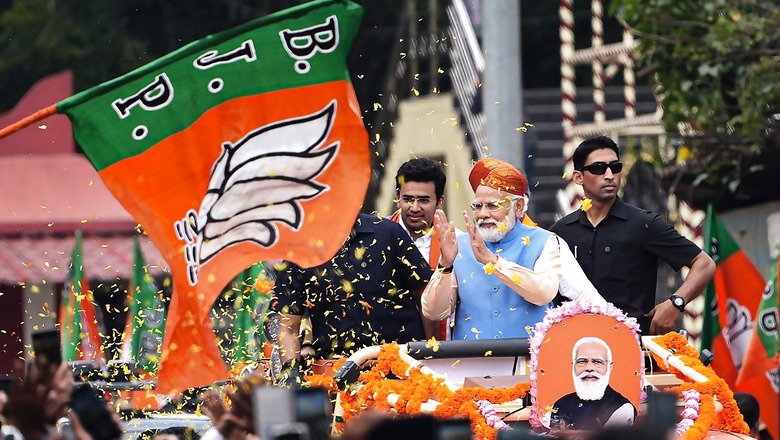
views
The much-awaited Karnataka ssembly election 2023 results are on the expected lines. The victory is a shot in the arm for the struggling Congress party and is bound to boost the morale of the party workers ahead of the Assembly polls in Rajasthan, Madhya Pradesh and Chhattisgarh, which will be held later this year. More importantly, Opposition unity talks will gain momentum in a big way. Bihar Chief Minister and Janata Dal (United) leader, Nitish Kumar, has already met a few Opposition leaders in his efforts to stitch together an anti-BJP alliance.
Can a united Opposition deny a third term to Prime Minister Narendra Modi in 2024?
Politics is the art of the possible and anything can happen within a year, but the Congress victory in Karnataka is no guarantee that the Bharatiya Janata Party (BJP) can be prevented from winning a third successive term. There is also no guarantee that the BJP could face defeat in 2024 even if the Congress again manages to win Rajasthan, Madhya Pradesh and Chhattisgarh.
As of now, there are only unanswered questions:
- Can the Opposition leaders put behind their egos, differences and ambitions to form a pre-poll block? Or can any Opposition alliance only be a post-poll arrangement depending on numbers?
- Will Congress be the axis of any pre-poll Opposition unity?
- And — the all-important question — who will be the prime ministerial candidate of the joint Opposition? Will it be Mamata Banerjee, Rahul Gandhi or Nitish Kumar? Or could it be Sharad Pawar who emerges as a compromise candidate?
There are no easy answers. In the 2018 Karnataka Assembly elections, the BJP emerged as the single largest party and fell short of a majority. But that did not prevent the saffron party from sweeping the state in the 2019 Lok Sabha polls. The Congress that had won 80 seats in 2018 could win only one Lok Sabha seat.
But what happened in Rajasthan, Madhya Pradesh and Chhattisgarh in 2019 was shocking. In the winter of 2018, the Congress:
- Won Chhattisgarh Assembly polls comfortably
- Secured a simple majority in Rajasthan with the support of six BSP MLAs
- Dislodged the BJP in a tight race in Madhya Pradesh
In five months, all those gains were wiped out. In the 2019 Lok Sabha polls, the Congress could win only two seats in Chhattisgarh, just one in MP, and it could not win a single seat in Rajasthan.
By now, it’s more or less clear from all accounts that state elections are largely fought on local issues and the popularity of regional leaders plays a major role in the outcome. A case in point being Mamata Banerjee and Naveen Patnaik, who remain formidable in their home turfs. But in the general elections, the equation can change quickly, if not always, and in all the states. At the same time, there’s no pan-India pattern of “split voting” either.
The nationalistic fervour post-Balakot strike and Modi’s strongman image are the two primary reasons generally attributed to the BJP’s emphatic 2019 victory. That may have been the case in Northern India and Gujarat but the same cannot be said about all of India — especially the South. In Andhra Pradesh, Jagan Mohan Reddy’s party and in Tamil Nadu, M K Stalin-led DMK alliance had made a clean sweep of Lok Sabha polls. K Chandrashekar Rao’s (KCR) party had managed to win more than half of the parliamentary seats in Telangana. In Kerala, the BJP couldn’t win a single seat. Karnataka was the sole exception.
In Odisha, Patnaik’s BJD once again won a landslide in the Assembly elections held simultaneously with the general elections but its Lok Sabha tally came down to 12 seats. The 2019 Lok Sabha elections dealt a big blow to Banerjee’s TMC as the BJP secured 18 out of 39 seats in Bengal, up from two in 2014. The 2019 Odisha results had generated a lot of chatter about “split voting.” But that’s difficult to establish since Patnaik’s party had won 20 out of 21 seats in 2014, despite the Modi wave. In Karnataka, the BJP has a strong presence but South India remains a big worry for the ruling party.
After the 2019 general elections, two significant developments have taken place in the Opposition camp. The first is the coming together of polar opposites such as the Shiv Sena, Sharad Pawar’s NCP and the Congress to form a government in Maharashtra. The dalliance lasted only two and half years till the Sena rebels, led by current Chief Minister Eknath Shinde, split the party. Despite court and Election Commission setbacks, ground reports suggest that Uddhav Thackeray still enjoys popular support, whose real test will be the next elections.
The other big shift was in Bihar where Nitish Kumar, true to his wont, ditched the BJP. He joined hands with Lalu Yadav’s RJD to recreate the ‘Mahagathbandhan’ that had defeated the BJP in the 2015 Bihar Assembly elections. This will be the first Lok Sabha test for the Mahagathbandhan in a state that majorly votes on caste lines. The outcomes in Bihar and Maharashtra that send 88 Lok Sabha MPs together can have a significant bearing on Opposition unity.
But not everyone is as enthusiastic about joining the oust Modi campaign. Patnaik, whose party has no national ambition, made it clear once again that he won’t join any front, a day after meeting Nitish Kumar in Bhubaneswar. Whether or not Jagan Reddy will be inclined to do so could depend on his rival Chandrababu Naidu’s next move. The strains in Opposition unity are already visible on issues like the Congress’ demand for Joint Parliamentary Committee (JPC) probe into the Adani controversy.
Who will be the Opposition’s PM candidate also remains a vexed issue. After the Congress lost the last two Lok Sabha elections under Rahul Gandhi, the regional satraps see him as more of a liability. Assuming the TMC and the DMK go on to sweep the 2024 elections, why would they hand the PM’s seat to Pawar?
It’s not the first time the Opposition leaders have embarked on attempting to create a grand alliance as an alternative to the BJP. Banerjee and KCR have both tried and failed before. Now, Nitish Kumar is giving it a shot. But without an active Congress role and an emphatic Congress performance, it could turn out to be a futile exercise as numbers would be difficult to add up. Also, the Congress is yet to set its own house in order in Rajasthan where the Sachin Pilot question remains unresolved and Jyotiraditya Scindia’s departure has weakened the party in Madhya Pradesh.
Plus, there is no clear sign of any anti-incumbency against the Modi government at the Centre and his popularity, by all accounts, remains intact. There is no reason to disbelieve that the BJP will sweep Uttar Pradesh yet again where its Chief Minister Yogi Adityanath enjoys massive public support. The Karnataka win may not mean much unless the Opposition scores big victories in more than one North Indian state. Despite the Karnataka loss, Modi remains in pole position as far as the 2024 race is concerned.
N C Satpathy is senior editor at CNN-News18. Views expressed are personal.




















Comments
0 comment